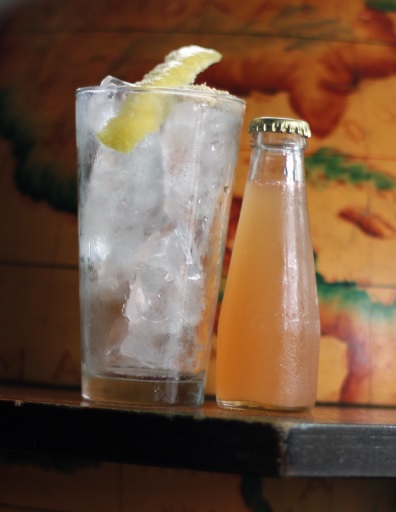“Just because a customer is drinking a soft drink, it does not mean they want to be treated like a less important consumer,” says Draper. “Discerning consumers still search for an experience they can’t get at home and now expect flamboyance, such as dedicated menus, interesting glassware and fresh garnishes with their drinks.
“The Franklin & Sons perfect serve guides have been designed to help bartenders and managers meet expectations and provide drinkers with the experience they desire.”
Frobishers Juices encourages bar owners to make its soft drinks more visible to customers, through imaginative displays, menus or blackboards.
“A customer wants to see choice and range whether they drink alcohol or not,” says Steve Carter, sales & marketing director.
“Our research revealed that all too often customers are left in the dark when it comes to the range of soft drinks available behind the bar and, as a consequence, opt for a run-of-the-mill low-value default purchase. This does little to inspire them or help the bar owner understand more about the potential value of the category.
“A little staff interaction, recommendation and enhanced display tactics can do much to reduce panic purchasing at the bar, encouraging customers to try something new and different and enabling the operator to benefit from the increased profit that a move to more premium-based products can offer,” he adds.
RIGHT AUDIENCE
When Fever-Tree launches a product, it seeds to appropriate key accounts where it is confident the customers will be made aware of it and will be able to experience it in a premium environment.
“Most recently we did this in London with the new ginger variants, seeding them to bars known for an exceptional range of dark spirits. That said, Fever-Tree is not just a UK brand and we have also conducted a multi-market PR roadshow, targeting key influencer cities with our dark spirit mixing message,” says Cuthbert.
Presentation includes the bottles themselves, and Indi & Co scores highly here thanks to its beautifully designed labels, which spill over to its outer packaging.
Coca-Cola may not be considered a ‘premium’ drink by some people, but there’s no arguing its popularity. Serving it in its iconic
glass bottle does convey a quality message and a One Pulse survey conducted earlier this year found that 75% of drinkers prefer the original glass bottle, with 64% of them happy to pay more for it.
Meanwhile Schweppes, which according to Nielsen data is the UK’s favourite mixer brand, is being backed by its biggest GB investment in 200 years. This includes the launch of a premium, skittle-shaped bottle as well as the introduction of the Schweppes 1783 naturally flavoured mixers range for “discerning drinkers”.
The new bottle was unveiled at London Cocktail Week where consumers took part in a flavour experiment in a multi-storey lab dating back to the 1800s.
As for the new Schweppes 1783 range, it is said to combine the perfect carbonation and balanced taste of Schweppes with natural ingredients and unique flavours.
The five-strong line-up comprises: Crisp Tonic Water, Light Tonic Water, Golden Ginger Ale, Salty Lemon Tonic Water and Quenching Cucumber Tonic Water.
In Spain, Coca-Cola recently launched the Royal Bliss range of premium mixers available exclusively in glass bottles in restaurants and bars. There are eight varieties including Expressive Orange (orange, grapefruit, mandarin, kumquat and tropical fruits) and Exotic Yuzu Sensation Tonic Water (mandarin, grapefruit and yuzu).
At the time of the launch, Paloma Cruz Caridad, director of carbonated beverages, Coca-Cola Spain and Portugal, said: “There’s a new generation of consumers with an eye for quality, care and detail. They are looking to experiment and are keen to discover new sensations.”
Finally, Red Bull recently launched a range of premium mixers on to the Austrian market. Called Organics by Red Bull it includes Simply Cola, which has been available for some time, but also Bitter Lemon, Ginger Ale and Tonic Water.
The range is certified as organic under EU definitions and is made from 100% natural ingredients.
The one sticking point is its packaging. Apparently the company trialled the drinks in glass bottles but reverted to 25cl cans, which are available in the on and off-trades. However, as many bartenders prefer a bottled mixer, it remains to be seen whether the company has another big hit on its hands.




